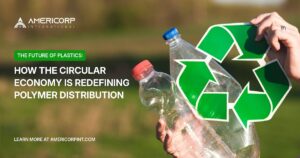Unveiling the Differences and Applications of Low-Density Polyethylene (LDPE) and Linear Low-Density Polyethylene (LLDPE)
Introduction
In the intricate landscape of modern industries, polymers stand as foundational materials, shaping everything from packaging to construction. Among the diverse array of polymers, Low-Density Polyethylene (LDPE) and Linear Low-Density Polyethylene (LLDPE) hold prominent positions. In this comprehensive comparison, we delve into the distinctive properties, applications, and advantages of LDPE and LLDPE. As we explore the intricate details of these polymers, we invite you to embark on a journey that uncovers the nuances of their roles in various industries.
Understanding LDPE and LLDPE
Low-Density Polyethylene (LDPE) Explained
At the molecular level, LDPE exhibits a unique structure characterized by long chains with a low degree of crystallinity. This molecular arrangement contributes to its remarkable flexibility, making it an ideal choice for applications that require stretchability and malleability. The manufacturing process involves high-pressure polymerization of ethylene gas, resulting in a polymer with a density typically ranging from 0.910 to 0.940 g/cm³. Leading producers like SABIC and Chevron Phillips Chemical have mastered LDPE production, contributing to its widespread availability.
Linear Low-Density Polyethylene (LLDPE) Unveiled
LLDPE, on the other hand, boasts a more linear and uniform molecular structure, achieved through copolymerization of ethylene and alpha-olefins. This unique structure grants LLDPE enhanced mechanical properties and improved heat resistance. LLDPE is produced using both high-pressure and low-pressure processes, resulting in a polymer with densities between 0.915 and 0.940 g/cm³. Companies such as NOVA Chemicals and INEOS Olefins & Polymers USA are renowned for their contributions to the LLDPE landscape.
Comparative Analysis: LDPE vs LLDPE
Density Matters: Defining the Crucial Parameter
The fundamental distinction between LDPE and LLDPE lies in their density. LDPE’s lower density grants it greater flexibility, while LLDPE’s higher density imparts improved mechanical strength and heat resistance. Choosing between these polymers hinges on the specific requirements of the application.
Mechanical Properties Showdown
Flexibility and Stretchability: LDPE’s molecular structure grants it unparalleled flexibility, making it a prime choice for products that require bending and stretching. LLDPE, while not as supple as LDPE, strikes a balance between flexibility and strength.
Tensile Strength and Impact Resistance: LLDPE’s linear structure provides it with higher tensile strength and impact resistance compared to LDPE. This makes LLDPE suitable for applications demanding toughness and durability.
Thermal Performance: Which Polymer Can Take the Heat?
When it comes to thermal resistance, LLDPE takes the lead. Its linear structure and crystalline regions allow it to withstand higher temperatures compared to LDPE. This makes LLDPE suitable for applications exposed to heat stress.
Chemical Resistance: Battleground of Compatibility
Both LDPE and LLDPE exhibit commendable chemical resistance. LDPE, with its amorphous structure, shows better resistance to some solvents, while LLDPE’s crystalline regions enhance its resistance to environmental stress cracking.
Processing Ease and Versatility
LDPE’s lower density contributes to its ease of processing, making it suitable for various fabrication methods, including extrusion and injection molding. LLDPE’s versatility shines through in applications requiring intricate designs and complex shapes.
Applications of LDPE and LLDPE
LDPE’s Application Landscape
Packaging and Films: LDPE’s flexibility makes it a staple in the packaging industry. It is used to produce plastic bags, shrink films, and stretch wraps due to its ease of sealing and ability to conform to different shapes.
Agricultural Uses: LDPE finds application in agriculture through the creation of greenhouse films, mulch films, and irrigation pipes. Its water-resistant properties and UV stability contribute to enhanced crop growth.
Consumer Goods: LDPE’s lightweight and versatile nature make it a favorite for manufacturing toys, containers, and squeeze bottles.
LLDPE’s Role in Various Industries
Rotational Molding Applications: LLDPE’s toughness and ability to maintain uniform wall thickness make it a preferred choice for manufacturing large, hollow products such as tanks, containers, and playground equipment.
Geomembranes and Pond Liners: LLDPE’s impermeable nature lends itself to the creation of geomembranes used in landfill liners, ponds, and water containment systems.
Flexible Packaging Advancements: LLDPE’s mechanical properties and heat resistance have led to its incorporation in innovative flexible packaging solutions, ensuring food safety and extended shelf life.
Market Trends and Demand
LDPE Market Dynamics
Global Consumption Patterns: LDPE’s applications in diverse sectors contribute to its steady demand, with packaging and construction sectors being major drivers.
Emerging Trends and Growth Factors: The rise of sustainable packaging and the circular economy has spurred renewed interest in LDPE for eco-friendly solutions.
LLDPE Market Insights
Market Share and Competitive Landscape: LLDPE’s mechanical prowess has earned it a significant share in the packaging and automotive industries.
Future Projections and Opportunities: As industries seek materials that balance performance and sustainability, LLDPE is poised to play a pivotal role.
Environmental Considerations
Sustainability at the Core: Americorp’s Commitment
Americorp, a trailblazer in polymer distribution, stands as a beacon of sustainability. Founded in 2013, Americorp takes pride in offering polymer solutions that align with environmental responsibility.
Eco-Friendly Initiatives in Polymer Production
The polymer industry is witnessing a shift towards greener practices. Companies are investing in research to develop biodegradable polymers, recycling technologies, and reduced energy consumption during production.
LDPE and LLDPE in the Circular Economy
Both LDPE and LLDPE can be recycled, contributing to the circular economy. By promoting recycling initiatives and designing products with end-of-life considerations, these polymers can find new life in various applications.
Case Studies: Real-World Applications
LDPE Success Story: Sustainable Packaging Solutions
Through innovative designs and responsible sourcing, LDPE has facilitated the creation of packaging solutions that minimize environmental impact without compromising product safety.
LLDPE Triumph: Revolutionizing Agricultural Practices
LLDPE’s resilience has revolutionized agriculture by enabling the creation of durable irrigation systems and water containment solutions, ultimately enhancing food production.
Selecting the Right Polymer: Factors to Consider
Tailoring Polymers to Specific Needs
Selecting between LDPE and LLDPE demands a thorough understanding of application requirements. Flexibility, strength, thermal resistance, and chemical compatibility must be carefully evaluated.
Collaborative Approach with Producers and Customers
Collaboration between polymer producers, distributors like Americorp, and end-users is essential to tailor polymer solutions that perfectly match application demands.
Americorp’s Polymer Offerings and Expertise
Unveiling Americorp’s Polymer Catalogue
Americorp’s extensive polymer catalogue encompasses LDPE, LLDPE, and a spectrum of other polymers, serving as a one-stop destination for diverse industrial needs.
Collaborations with Leading Producers
Americorp’s collaborations with industry giants such as Muhtaj
at, LG Chem, and BAYSTAR ensure a steady supply of high-quality polymers to global clients.
Global Reach and Seamless Distribution
Strategically positioned offices around the world empower Americorp to seamlessly connect international polymer producers with clients, ensuring efficient and timely distribution.
Empowering Industries with Polymer Solutions
Driving Business Success Through Innovative Polymers
Americorp’s commitment to excellence and sustainability empowers industries to achieve business success while minimizing their ecological footprint.
Sustainability and Quality as Cornerstones
At the heart of Americorp’s philosophy lie sustainability and quality, driving their mission to provide the best polymer solutions while safeguarding the planet.
Conclusion: Choosing the Path Forward
The LDPE vs LLDPE Dilemma: Which One Wins?
The LDPE vs LLDPE comparison showcases the unique strengths and applications of each polymer. The choice ultimately rests on understanding the specific needs of the application.
Partnering with Americorp: Your Path to Polymer Excellence
As a global leader in polymer distribution, Americorp stands ready to guide you through the intricate world of polymers. With a commitment to sustainability, innovation, and quality, Americorp is the preferred partner for your polymer journey.
In the realm of plastics and chemicals, LDPE and LLDPE represent a pivotal crossroads. As you navigate this complex landscape, remember that your choice of polymer shapes not only your products but also the future of your industry. Whether it’s LDPE’s flexibility or LLDPE’s mechanical prowess that beckons, the journey forward is illuminated by the innovative solutions crafted by Americorp and its pioneering spirit in sustainable polymer solutions.
Ready to embark on a polymer journey that transforms industries? Reach out to Americorp today to explore the possibilities.








